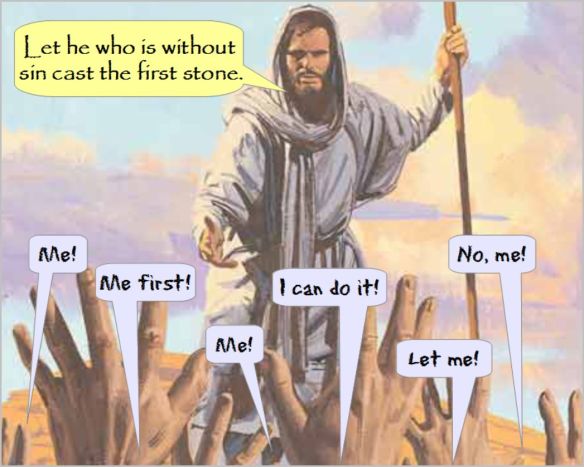
Ken Ham’s Answers In Genesis thinks it’s okay to stone people. Specifically, your wayward kids. The bible says so and AiG’s Elizabeth Mitchell is eager to defend whatever the bible says, on account of it being ‘God’s Word’. She does warn us that we need to read Deuteronomy 21:18–21, where you’ll find this particular bit of parenting advice, in context, because although the bible is the fallible, eternal, literal word of the Creator of the Universe it needs interpreting, and has to be understood in terms of the time it was written.
The context is of course that Deuteronomy and all of the Old Testament was written by primitive, superstitious bronze-age tribesmen who had the same mentality the Taliban and Isis have today. But this isn’t good enough for ‘Doctor’ Mitchell. No, her context is altogether different; she tells us in an article recently posted on the Answers In Genesis Facebook page that Deuteronomy 21 isn’t talking about children. No, it’s referring to uppity teenagers, which makes it okay. And not just teenagers, but really, really troublesome ones, which makes it doubly okay. These really, really troublesome teenagers are the scourge of society and can be stoned with impunity. The bible says so.
And yet, they’re not. Christians don’t stone awkward family members, thankfully. Perhaps, despite articles like Mitchell’s and others’, Christians don’t really believe the brutality promoted in and by the bible. Mitchell offers no explanation for this inconsistency of belief. Instead, her article peters out with some incoherent rambling about Jesus; the same Jesus who declared his undying support for these brutal, Old Testament laws (Matthew 5.17-19).
I suggested in the comments on Facebook that it doesn’t matter how much one takes context into account, the command of Deuteronomy, that rebellious youths be stoned to death, is utterly indefensible. It is cruel, barbaric and belongs in the past when, presumably, unfortunate young people were actually killed in this way by their families and tribal elders. I suggested morals and standards have evolved for the better since the days when people considered that murder was the best way to deal with youthful bad behaviour.
And for that I was metaphorically stoned myself. How dare you challenge God and his Word! How ridiculous to suggest we have better moral standards today when clearly we are in an immoral abyss worse than any before! Last Days! God’s standards are inviolate and if he says the best way to deal with miscreants is to stone them to death then it is!
The Gilead regime envisaged by Margaret Atwood in The Handmaid’s Tale, where Old Testament sanctions are stringently applied in contemporary society, is closer than we think. People like those who hang around on Answers In Genesis’ Facebook pages, like flies around a corpse, would be more than happy to see the death penalty for those who infringe God’s barbaric laws. They’d be only too willing to throw the first stone, not only at difficult teenagers, but at all the others ‘God’s Word’ says merit the death penalty: couples who have sex when the woman is on her period (Leviticus 18.19); women who are not virgins on their wedding nights (Deuteronomy 22.13-14; 20-21); gay people (Leviticus 20.13); those who work on the Sabbath (Exodus 35.2; Numbers 15.32-36); blasphemers (Leviticus 24.16) and worshippers of other gods (Deuteronomy 13.6-9).
I am not an advocate of censorship but some form of censure is necessary for those who, either in speech or writing, advocate that others be put to death. Calling for the execution of those with whom you disagree or who have different moral codes cannot – must not – be tolerated in a civilised society. Pronouncements like those of Elizabeth Mitchell, her supporters and other religious crackpots who defend the indefensible, should be flagged up as hate speech, carrying a warning that the views expressed are themselves immoral, insupportable and, ultimately, illegal in civilised society. Ideally, their poisonous rhetoric should not be provided with an online platform. This wouldn’t, before anyone suggests otherwise, violate their right to free speech; they would still be free to express their unpalatable views in their churches, Creation Museums and own homes. Excluding them from Twitter, Facebook and YouTube, however, would deprive them of their wider audience – they’re only showing off, after all – and confine their hateful rhetoric to where it can do least harm.
These people are not merely ‘causing offence’ – offence is not the issue. They are inciting violence against others, influencing fellow believers to adopt their repellent views as their own. The standards of bronze-age tribes are not ours today; those who think they are abuse free speech and forfeit their right to be heard publicly.




